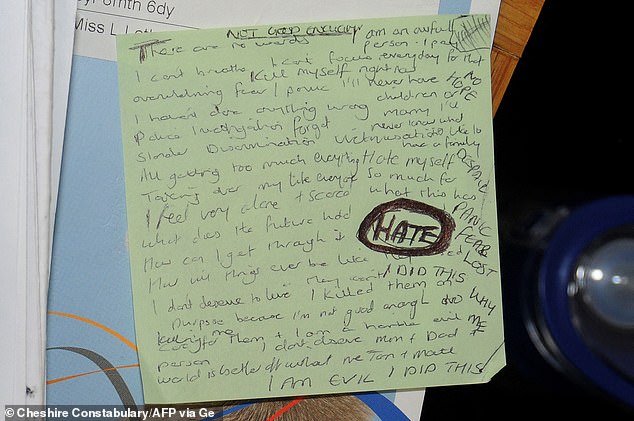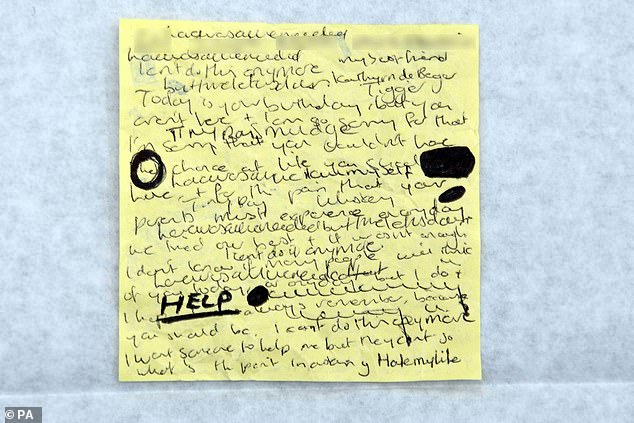As the case against nurse Lucy Letby dwindles from slam-dunk certainty to shifting doubt, it is surely time to look again at the supposed ‘confession’ which persuaded so many people that she had killed or hurt babies at the Countess of Chester Hospital where she worked.
When this strange collection of Post-it notes and bits of paper emerged, Ms Letby’s guilt was widely presumed outside the courtroom.
And I know from talking to Mail readers that many were persuaded by the things she wrote.
Apart from the now-discredited chart, supposedly showing Ms Letby present at all the deaths and injuries, these notes were the most potent thing the prosecution had.
The Crown used them to make its case against Ms Letby, especially emphasising the words: ‘I am evil I did this.’
The jury was several times reminded of those words – and advised to take them literally.
Who can blame the prosecution for making so much of such a precious find? The rest of their evidence was just guesswork and theory, airy ideas about what might have happened, no facts about what did happen.

There is strong evidence that the hospital’s head of occupational health and wellbeing encouraged Lucy Letby to write down her grimmest thoughts as part of what is now normal practice in cognitive behavioural therapy
The notes were written at some point between July 2016, after Ms Letby had been barred from continuing on the neo-natal unit, and the first of her three arrests, in July 2018. It was that arrest which allowed police to search her home.
You’ll remember the scraps of paper unearthed by those searches, containing the word HATE ringed in black, and the apparent confession: ‘I AM EVIL I DID THIS.’
Then there were the words: ‘I killed them on purpose because I’m not good enough to care for them’ and ‘I am a horrible evil person’. Bang to rights, you might think, and off to prison with her straight away.
Yet David Wilson, a professor of criminology at Birmingham City University, who specialises in serial killers, has dismissed the notes as ‘meaningless’, saying they have no value as evidence, particularly if they had been written as part of counselling.
‘Many people will say things when they are under stress and feeling bereft that seem to imply one thing but mean nothing at all, other than reflecting the underlying stress,’ Wilson has said.
‘I always thought Letby’s notes were meaningless as evidence. If they were written as part of therapy, you can underline that point three times and write it in bold and capital letters.’
You might think that Prof Wilson was one of those campaigning to reopen the case. But he is not. So his dismissal of the ‘confession notes’ is particularly striking.
What then do they mean? Many people have tried to get order out of their chaos and to work out the sequence in which they were written. But the explanation may be simple, and it is time the debate about the case took this on board.

While searching Ms Letby’s home, the police found the scraps of paper, containing the word HATE ringed in black, and the apparent confession: ‘I AM EVIL I DID THIS’

David Wilson, a professor of criminology at Birmingham City University, who specialises in serial killers, has dismissed Ms Letby’s notes as ‘meaningless’, saying they have no value as evidence, particularly if they had been written as part of counselling
There is strong evidence that the hospital’s head of occupational health and wellbeing, Kathryn de Beger, encouraged Ms Letby to write down her grimmest thoughts as part of what is now normal practice in cognitive behavioural therapy (CBT). Some CBT techniques involve several steps including:
1. The situation – what happened? For example: ‘I am annoyed at myself for forgetting to run an errand’;
2. My feelings – how this made you feel at first. For example: ‘Frustrated, stupid’;
3. Unhelpful thoughts I had. For example: ‘I’m useless and cannot be trusted with simple tasks.’ Ms Letby also wrote ‘Why me?’, ‘not good enough’, ‘I haven’t done anything wrong’ and ‘police investigation slander discrimination victimisation’.
Now widely referred to in the media as ‘the confession notes’, they were written after some colleagues started suspecting her, but before the case took on its full power. In general, she seems to have been afraid her medical competence was being questioned.
The unhappy scribblings referenced her family, pets and colleagues at work, and described suicidal thoughts: ‘Kill myself right now’, ‘help’, ‘despair panic fear lost’, ‘I feel very alone and scared’.
If you take these all together, it is hard to disagree with Prof Wilson that they shouldn’t have been used to help convict her. It’s also worth noting that in a statement to the Thirlwall Inquiry into the case, Ms de Beger wrote: ‘I feel privileged at being asked to support Lucy over such a lengthy period and to support Lucy over these very hard times for her.’
Would you say that, if you thought the person you were counselling, with whom you’d spent many private hours, was a mass-killer of babies?











